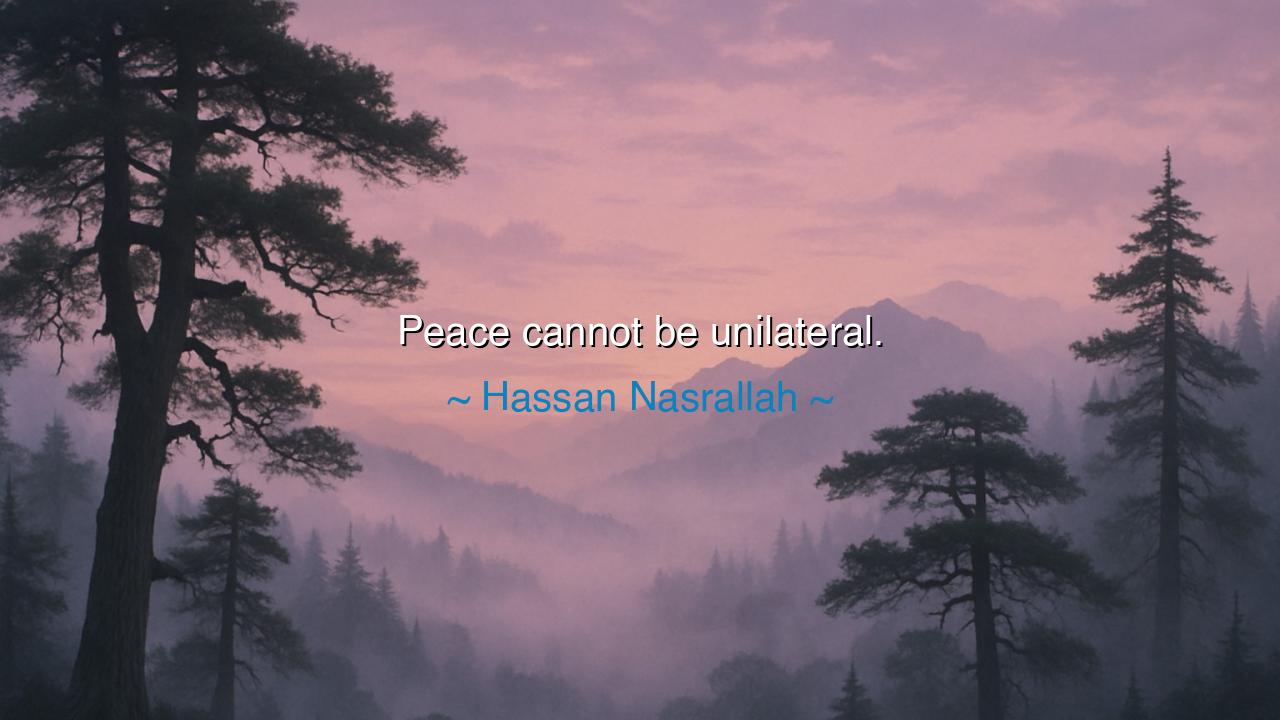
Peace cannot be unilateral.






Hear the solemn words of Hassan Nasrallah, who declared: “Peace cannot be unilateral.” In this brief but thunderous truth lies the essence of conflict and reconciliation across all ages. For peace is not the possession of one side, nor can it be forged by the decree of one power alone. True peace is a covenant, born when enemies choose dialogue over destruction, and when mutual recognition replaces domination. To seek peace without reciprocity is to build a bridge that reaches only halfway across a river—it cannot bear the weight of travelers, and soon it will collapse.
The origin of these words is found in the turmoil of the Middle East, where wars, occupations, and hostilities have endured for generations. Nasrallah, a leader forged in the fires of conflict, spoke not merely as a strategist but as one who understood that unilateral peace—peace dictated by the strong upon the weak, or claimed by one while denied by another—is no peace at all. The lesson is not bound to his land alone; it belongs to the human condition itself. For wherever injustice persists, harmony cannot be forced by the will of only one side.
History bears testimony to this truth. Consider the Treaty of Versailles after the First World War. Germany was burdened with crushing demands, stripped of dignity, and bound by terms it had no voice in shaping. The victors proclaimed peace, but for Germany it was humiliation. And what followed? Not harmony, but the rise of bitterness, resentment, and war again, greater than before. Here we see the wisdom of Nasrallah’s words: that peace forced upon one, without the consent of both, is but the seed of future conflict.
Yet the opposite lesson is also true. When after decades of hostility, Anwar Sadat of Egypt and Menachem Begin of Israel sat together at Camp David in 1978, the peace they forged endured because both sides entered into it. It was not the peace of conquest, but the peace of negotiation. Egypt recognized Israel, and Israel restored Sinai to Egypt. Though challenges remained, this agreement still stands as one of the rare moments in the region where peace held—because it was not unilateral, but mutual.
So too in our own lives does this teaching resound. In families, in friendships, in communities, how often does one person declare peace while the other remains unheard, their wounds ignored? Such peace is fragile, an illusion that masks simmering resentment. Only when both parties speak, listen, and yield can reconciliation be made whole. To demand peace without offering justice is to demand silence, not harmony. And silence, unhealed, always breaks.
The lesson is therefore clear: peace requires reciprocity. It demands courage not only to lay down arms, but to open ears and hearts. It requires humility, for each side must admit its part in the conflict. It requires sacrifice, for compromise is the price of harmony. Whether between nations or neighbors, peace cannot be declared by one; it must be chosen by all.
Therefore, remember this teaching: “Peace cannot be unilateral.” Do not be deceived by proclamations of peace from those who will not listen, nor by truces that ignore justice. Seek always the deeper peace, the one born of dialogue, of fairness, of mutual recognition. In your own life, do not call yourself reconciled until both hearts are healed. For true peace is not the absence of war alone—it is the presence of justice, chosen by more than one, and shared by all.
–––






GTGiang Tra
I appreciate Nasrallah’s perspective on peace because it highlights the need for balance and fairness. Unilateral peace may be a fleeting illusion, but what does true peace look like when both parties are involved? Can we define peace as mutual understanding, or does it require action from both sides to show commitment? How do we ensure that peace is not just a temporary ceasefire, but a sustainable and equitable resolution?
HHHtc Htc
Nasrallah’s statement seems like a stark reminder that peace is not something that can be dictated—it’s a collective effort. But if peace requires both sides to act, what happens when one party is not interested in making the effort? Can peace truly happen if one side feels wronged or marginalized? How can we bring both sides to the table when there’s such a deep divide in interests and values?
Hhnilyuth
I agree with Nasrallah's view that peace cannot be unilateral. Peace requires understanding from both sides, but does this always mean that both sides must agree on everything for peace to occur? Or is there room for differing views in a peaceful resolution? It seems like peace involves not just agreement, but a recognition and acceptance of each other's differences. How do we balance those differences while still working toward peace?
TPNguyen Thien Phuong
Nasrallah’s view that peace cannot be unilateral speaks to the importance of collaboration. It’s clear that peace can’t be forced, but it also raises the question—what happens when one party is unwilling to engage? Can peace ever be truly reached in situations where one side feels that their needs are not being met? How do we ensure that peace is not one-sided, but a real, balanced agreement?
PTPham Tinie
This quote makes me think about the complexity of peace. It’s not something that can just be imposed by one side, but requires effort and willingness from all parties involved. But how do we foster that willingness? Can peace be achieved through diplomatic pressure, or does it require genuine interest and change from both sides? What role does trust play in this process of mutual peacebuilding?